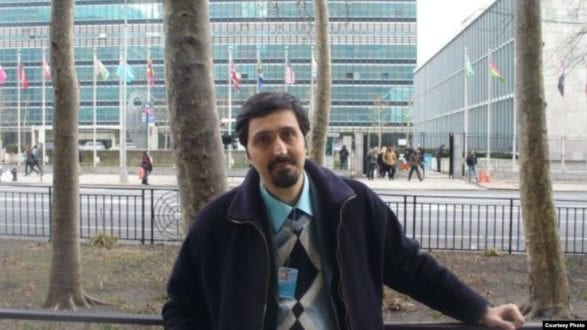Al-Monitor – Held in solitary without a formal charge for nearly 100 days, Sharmin Meymandi-Nejad, the founder of a reputable Iranian charity, is facing deteriorating health as interrogators protract his indefinite detention.
Members of Iran’s civil society have raised serious concerns about the prolonged detention and worsening health condition of Sharmin Meymandi-Nejad, a prominent activist, outspoken government critic and founder of one of the country’s most popular private charity organizations.
Meymandi-Nejad has been in the custody of the Intelligence Organization of the Islamic Revolutionary Guard Corps (IRGC) since June 22. During that time, the 50-year-old philanthropist has been kept in solitary confinement, deprived of visits and access to his lawyer.
The detainee’s wife, Zahra Rahimi, said earlier this month on Twitter that in a brief call from jail, Meymandi-Nejad had complained about his deteriorating health, saying he badly needed a walker to be able to stand up. Meymandi-Nejad has also urged “forgiveness,” a typical request that Iranians make to family members and relatives at moments of looming death.
And in an interview with Shargh, a pro-Reform daily, Rahimi said interrogators have been denying her husband the much-needed medicines he regularly takes for a heart problem as well as his “ankylosing spondylitis,” a rare but acute type of spinal cord arthritis.
The account has caused alarm from Meymandi-Nejad’s supporters and other activists, who are speculating that alleged torture made him ask for a walker. “When he left home upon arrest,” Meymandi-Nejad’s wife said, “he was in good health. … The judiciary bears direct responsibility.”
In July, UN High Commissioner for Human Rights Michelle Bachelet also expressed alarm over Meymandi-Nejad’s arrest, calling it “a clear example of the [Iranian] government’s tightening of measures targeting civil society actors.”
In 1999, Meymandi-Nejad founded the Imam Ali Popular Student Relief Society, initially relying on a small circle of top university students in the capital, Tehran. But over years, the organization has grown into a nationwide network of 10,000 altruist volunteers dedicated to providing relief and other help for Iran’s most impoverished and neglected areas.
What has distinguished the group from other Iranian charitable organizations is its special concentration on empowering single mothers and providing proper education for abandoned and abused shantytown children, some of them garbage scavengers, with the aim boosting their opportunities for social mobility. As of July, the relief society was helping 6,137 of those kids across 20 Iranian provinces.
Meymandi-Nejad has played a pivotal role, regularly visiting the target areas and delivering almost weekly speeches in which he has not shied from taking aim at “systematic corruption and mismanagement” plaguing the ruling establishment.
“The extension of Meymandi-Nejad’s detention is only explained by the fact that the IRGC needs time to fabricate a setup against him based on forced confessions,” said senior Iranian lawyer Hassan Younesi. Drawing confessions under duress before airing them on state television has often be characteristic of Iran’s security system toward domestic opponents. Most recently, one such TV program showed Iranian wrestler Navid Afkari — arrested in the aftermath of an anti-government protest — confessing to “murder.” A week later, Afkari was sent to the gallows.
While there is no formal indictment against Meymandi-Nejad as of yet, the arrest warrant, seen by the charity group’s senior members, accuses him of “insulting” Supreme Leader Ayatollah Ali Khamenei. Meanwhile, IRGC-owned media outlets have released an audio file in which Meymandi-Nejad is heard attacking IRGC commander Qasem Soleimani — who was killed by the United States in January — as “a murderer of children.” In what seems to be an anti-war speech in the same file, the charity founder also criticizes the Iranian government’s “irrationality” and elaborates on a formal request to be submitted to the United Nations, asking for intervention to save Iranians from an unnecessary military conflict in the aftermath of Soleimani’s death.
In a statement, the charitable organization said Meymandi-Nejad’s comments had been taken out of context, and slammed state-funded outlets for labeling the activist as a “convict” before any judicial proceedings had taken place. A group of the families of Iranian “martyrs” also signed a public letter addressed to chief justice Ibrahim Raisi wondering why the Islamic Republic had arrested Meymandi-Nejad instead of honoring him. Such detention, the signees warned, only “discourages sincere work by volunteers dedicated to the poor, who have been wounded by discrimination and inequality.”
The Tasnim News Agency, run by the IRGC, has accused Meymandi-Nejad of establishing a network to “infiltrate Iranian public opinion” under the guise of charity programs. Tasnim did not elaborate on the nature of that influence, but the statement has strengthened theories that the charity group’s growing popularity among the destitute layers of the Iranian society is viewed by the Islamic Republic as a potential security threat, one that could translate into a mobilization of the disillusioned classes against the state.
Since the outbreak of countrywide economic protests in late 2017, Iran’s intelligence organizations have grown increasingly conscious about, and particularly alarmed by, a disenchanted, furious lower class. This could perhaps explain why the Islamic Republic went to great lengths in its unprecedentedly violent crackdown in November, killing at least 225 protesters during street demonstrations that were triggered by a controversial fuel price hike, but which quickly gathered steam to turn into a national uprising over a host of deep-seated livelihood grievances.
 Shabtabnews In this dark night, I have lost my way – Arise from a corner, oh you the star of guidance.
Shabtabnews In this dark night, I have lost my way – Arise from a corner, oh you the star of guidance.



